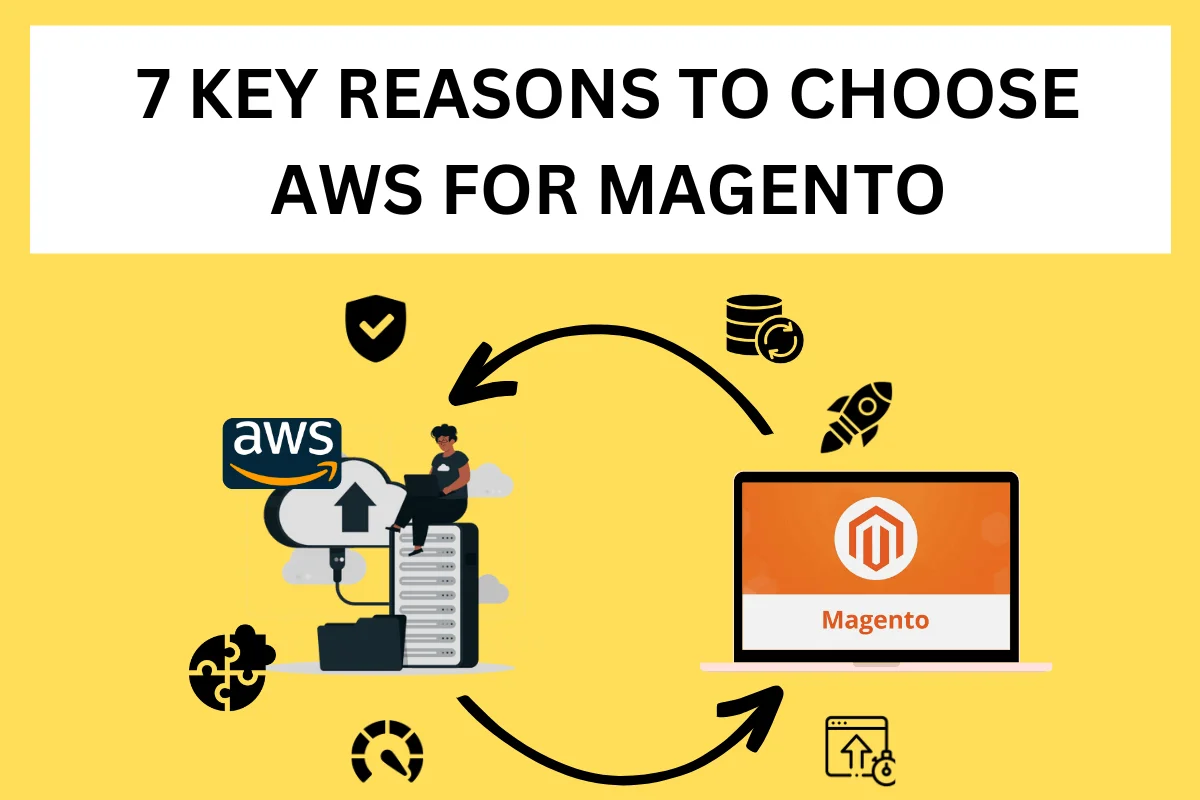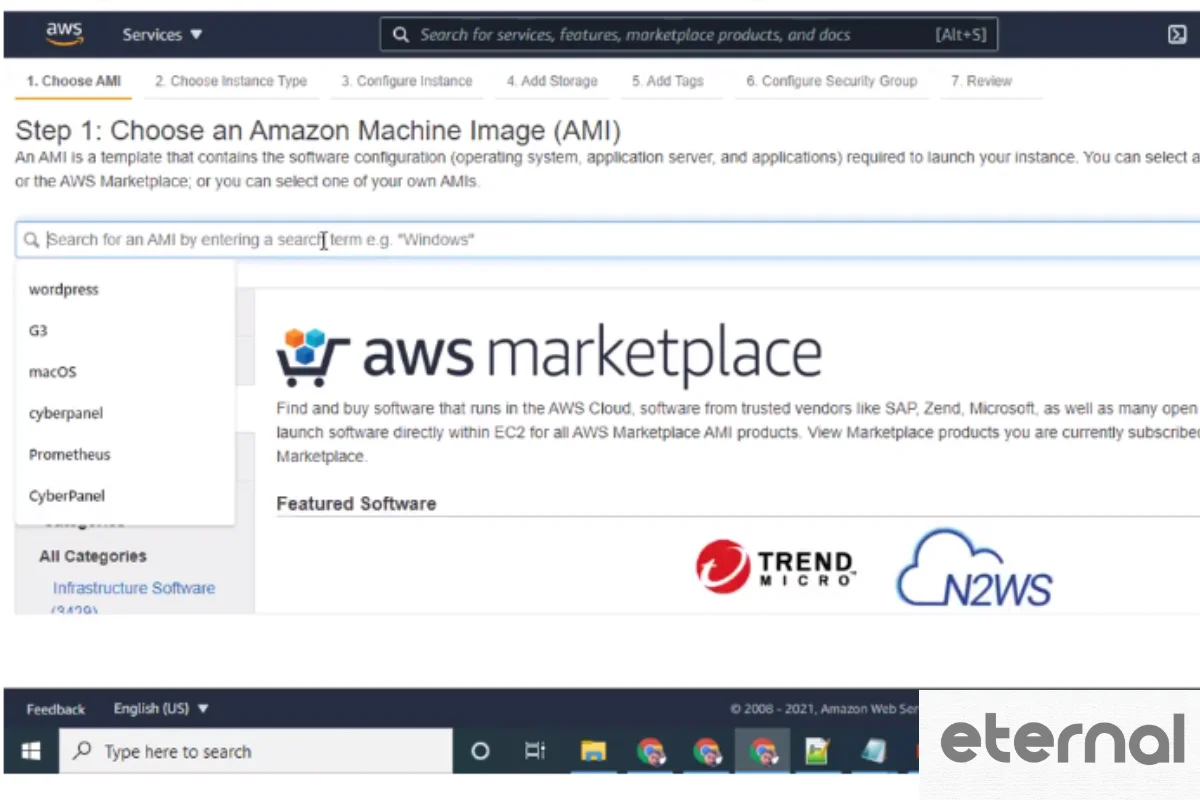February 21, 2023 / Nirav Shah
Are you looking to maximise performance and scalability while maintaining the security of your eCommerce website? Look no further than Magento on Amazon Web Services (AWS).
With an ever-growing list of features, AWS is becoming the most popular solution for businesses large and small. So, whether you are looking to migrate Magento to AWS or deploy a brand new store, you should better turn to AWS as the go-to platform.
As such, it can be incredibly beneficial for CXOs alike to understand what Magento on AWS web services can do for them. That is why this ultimate guide will provide all the details you need about choosing, setting, installing, enabling best practices, and precise use of this powerful AWS platform along with pros and cons of AWS hosting.
7 Key Reasons to Choose AWS for Magento
A.) Higher Security Measures
B.) No Negotiation on Performance Levels
C.) Lessons Deployment Time
D.) Quicker Page Load Times
E.) Robust Integrations
F.) Easy Testing and Backup Access
G.) Cost-effectiveness
Approaches to Set up a Magento Store on AWS
How to Install Magento in AWS?
Magento AWS Architecture
Advantages of Hosting Magento on AWS
Disadvantages of Hosting Magento on AWS
Magento AWS Best Practices
A.) Leverage EC2 Auto Scaling
B.) Utilise an Optimised AMI.
C.) Employ Optimised EBS Storage.
D.) Utilise CloudFront for Content Delivery.
Moving Forward
Talk to AWS Certified Consultant
AWS is a highly scalable, secure, and reliable cloud-based infrastructure platform that lets you quickly launch your eCommerce store in Magento and provide customers with a good experience.

Let us discover significant reasons why you should pick AWS for Magento:
The factors that make AWS one of the most secure hosting for your Magento store are its encrypted environment, secure reports, encrypted data storage, inbuilt firewalls for defence, and data security. With these features in place, you can rest assured that your business is safe and secure on AWS.
AWS offers private subnets to ensure extra privacy and security, as well as attestations and certifications to guarantee quality standards of online security protocols. All these measures together provide an unbeatable level of protection for businesses using AWS for their Magento stores.
One of the main benefits of leveraging AWS for hosting your Magento store is no compromise on performance promises. With AWS, you can be sure your store will stay up and running with no negotiation in performance.
AWS’s high speed makes it more reliable than other providers and provides a great advantage to businesses, especially when working with high-traffic websites.
Its robust infrastructure guarantees efficient operations management, allowing a smooth experience for both users and developers.
Magento with AWS drastically trims down the deployment time compared to traditional web hosting companies. Deployment speed can be a critical factor in the success of an e-commerce website, and using AWS for Magento hosting helps you get your store set up and running quickly.
With traditional web hosting, setting up services and a new server could take anywhere from two to four days. With AWS, that time is reduced, so you can start operating and testing your Magento store almost instantly.
Once the site is hosted on AWS, page load times can be significantly reduced. This is because Amazon Web Services uses state-of-the-art technologies such as Elastic Load Balancing (ELB) and Amazon CloudFront, allowing faster content delivery. Additionally, Amazon S3 storage provides increased scalability and performance.
Integrations with the AWS services offer an easy way for businesses to access data, applications, and resources hosted on different platforms. Through this integration, organisations can securely bridge the gap between cloud and on-premise systems.
The integrations also help streamline operational processes, create a cohesive user experience, and ensure reliable data security.
Amazon AWS ensures a secure environment to operate and test your Magento almost mutually and instantly. It offers testing functionalities required when running diverse events on your online store with managed security options.
With these functionalities, you can test and manage access to your data with ease. Besides that, Amazon AWS provides automated backups so that you never have to be anxious about losing data due to technical issues.
AWS provides a cost-effective and reliable hosting environment for Magento stores. It eliminates the need to purchase costly hardware and software, as you can use what you need.
Moreover, it offers a pay-as-you-go pricing model that enables businesses to adjust their services according to their requirements.
Once you have chosen an AWS hosting platform for your Magento store, the next step is to configure the best web server for Magento. Reliant on your requirements, there are numerous selections accessible.
Amazon LightSail offers a preconfigured virtual private server (VPS) explicitly optimised for running Magento if you want cost-effectiveness and Magento AWS QuickStart. The setup process is straightforward and only requires basic knowledge of web administration tools such as SSH.
Alternatively, if you need more control over the environment and resources used by your site, then you may want to use Amazon EC2 instead of LightSail. This option provides more flexibility and allows users to customize their hosting configuration as needed.
Once you have your AWS environment up and running, the next step is to install Magento. The process can be a bit involved, but following these steps will ensure a successful installation:

Related: Install Magento in AWS Step By Step: The Ultimate Setup Guide
The Magento AWS architecture is a powerful solution for businesses looking to maximise their e-commerce capabilities. By partnering with Amazon Web Services, Magento can provide an end-to-end platform that facilitates creating, launching, and managing an online store.

Magento’s comprehensive suite of tools allows business owners to create custom storefronts tailored to their needs. This includes creating product catalogues, setting up payment gateways, deploying marketing campaigns, and tracking customer analytics. All this can be done quickly and easily using the Magento Admin Console.
Amazon Web Services provides scalability, reliability, security, automation, analytics, and data intelligence capabilities on the backend.
Hosting Magento on Amazon Web Services (AWS) provides several significant advantages.
Finally, hosting through AWS allows for greater flexibility in the underlying infrastructure, making it easier to deploy new services quickly and efficiently without needing significant hardware or software license investments.
AWS hosting of Magento can come with some serious disadvantages. Firstly, there is the cost: Hosting on AWS can be expensive because you need to pay for several services and resources to make it work reliably, such as server instances, storage, and databases.
The costs can quickly mount up if your site experiences high traffic or requires complex customisations. Also, configuring and maintaining an AWS hosting environment for Magento requires technical knowledge and experience, which could be challenging for businesses without expertise or resources.
One of the best approaches to maximise your Magento site’s performance is by following AWS best practices. By utilising Amazon Web Services, you can take advantage of their powerful yet cost-effective cloud computing solutions and ensure that your site runs smoothly even under a heavy load. Here are some of the top Magento AWS Best Practices you should consider:
AWS’ EC2 auto-scaling can help you add or remove instances of your Magento store and services to adjust to changing demand.
This will ensure that your site runs optimally during peak hours, helps reduce costs during low-traffic times, and helps prevent downtime scenarios due to unexpected loads.
Amazon Machine Image (AMI) is a preconfigured operating system and application stack that can launch servers quickly in the cloud. Using an optimised, Magento-specific AMI, you can save time setting up your instances and ensure they are configured with the latest security patches and best practices.
Elastic Block Storage (EBS) is a virtual disk that can be attached to your EC2 instances and used for storing data such as your Magento database, images, videos, etc. You should optimize your EBS storage by keeping frequently accessed data on the same disk and setting up multiple volumes to support more concurrent connections.
AWS’s content delivery network, CloudFront, can help you serve your Magento site’s static content (images, videos, etc.) to users from edge locations worldwide.
With Eternal, you can rest assured that your Magento store will be hosted on a reliable and secure cloud platform compliant with industry standards.
Our AWS services will provide your store with the best Magento hosting performance. Our AWS-certified professionals offer flexible and compliant cloud solutions tailored to meet your needs, helping you quickly empower Amazon’s cloud tools and technologies.
Connect with us today to find out how we can help you unlock the power of AWS for your business.

As a Director of Eternal Web Private Ltd an AWS consulting partner company, Nirav is responsible for its operations. AWS, cloud-computing and digital transformation are some of his favorite topics to talk about. His key focus is to help enterprises adopt technology, to solve their business problem with the right cloud solutions.
Have queries about your project idea or concept? Please drop in your project details to discuss with our AWS Global Cloud Infrastructure service specialists and consultants.